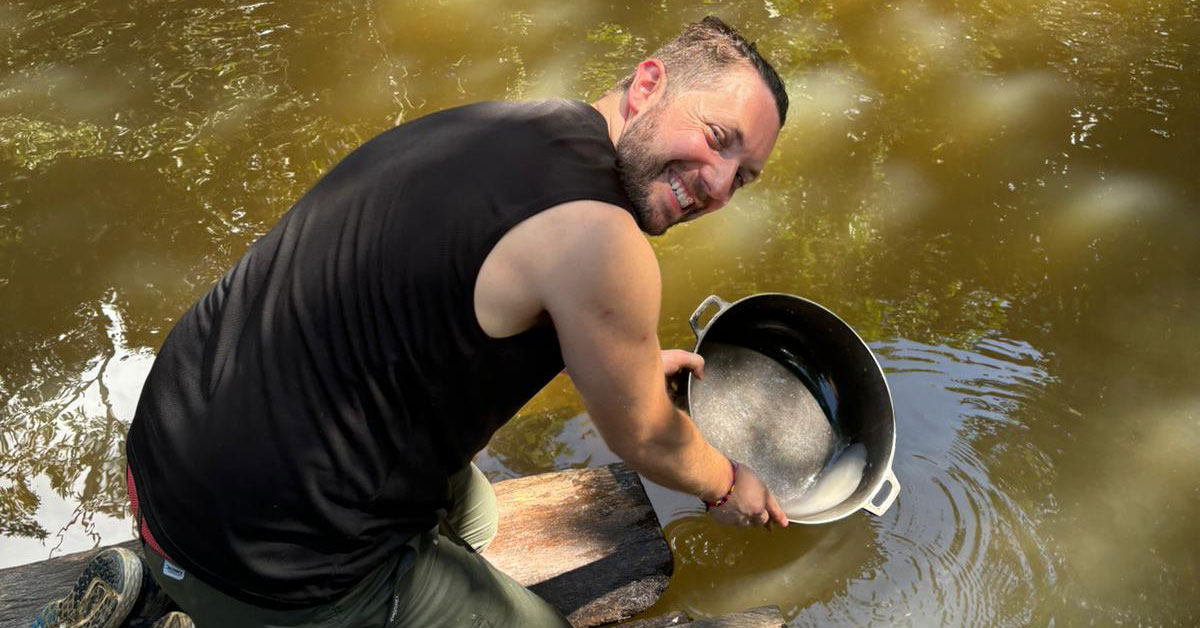Connecting with the Amazon and Its People
Blog #2 – Leticia and Amazonas, Colombia
By Dr. Bobby Gondola, Jr.
with Lyndsy Tainsh and Susanne Wissell
BLOG #1 — BOGOTA
The Journey Continues
Arriving in the city of Leticia in the state of Amazonas
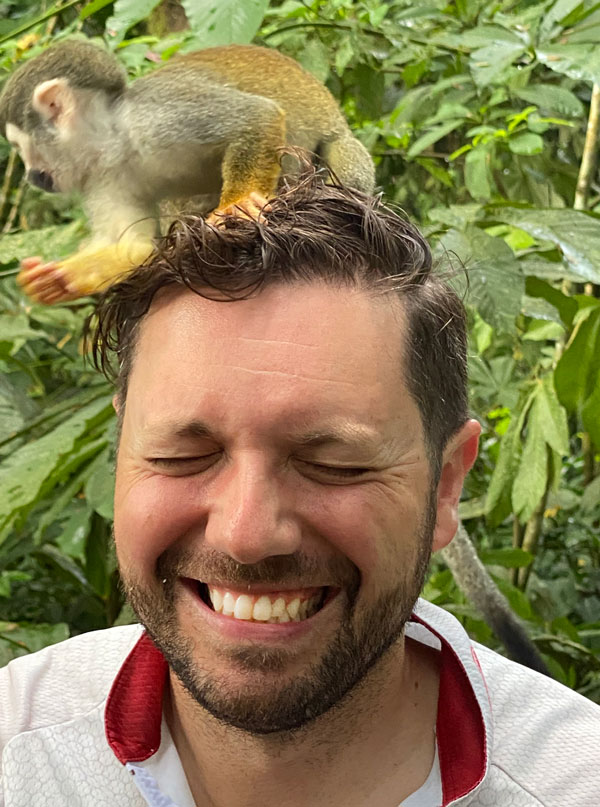
First out of my seat and off the plane, I left ahead of the group because torrential downpours started as we were deplaning. I put on the plastic poncho I had in my backpack — but with the humidity soaring around 100% and the high-90s temperature heating the hot blacktop runway, that poncho was baking me.
Landing in the Amazon was a sight! Trees were abound for miles in every direction, and the Amazon River snaked through the canopy of never-ending green – it is the second longest river in the world, after all. The location of the hotel was amazing; it was a short walk to the river, but it was also a short walk to the country of Brazil! And after one short boat ride across the river, we were welcomed in Peru. We rested for the remainder of the day, because the organizers said we would need our energy for the following day.
Entering the Amazon
We awoke, and we were reminded via SMS to be sure to be appropriately prepared to enter the Amazon. Still waking up, and I wondered “What does this mean?” I pulled myself together, made sure I had layers of clothes and a few liters of water, and went out to meet the transport. We boarded an old van and drove down roads covered with trees and branches, while avoiding deep puddles. Then the driver stopped at a bridge alongside a bubbling stream surrounded by trees and said, “Aquí estás [Here you are]” and continued, “Get out here,” with a huge grinning smile.
Greeted by three guides, who I saw appear one by one, as they emerged from the brush — our group was asked to split into teams of three. Donned with a gaucho hat, sunscreen, and lots of bug spray, I joined the team for our trek into the Amazonian jungle.
Butterflies were abound, and frogs, birds and rich plant life were visible in every direction. The dense tree cover provided relief from the hot daytime sun, and I thought it was surprisingly cool while still being very muggy under the tree canopy. We scaled rocks, crossed streams and enjoyed the rich flora and fauna we encountered along the way. Sadly, no jaguars, though.
We walked a few kilometers until we were greeted by a woman, Analita, from the Okaina Village in Murui. She greeted us as we were welcomed to her traditional home. There, we were promised an experience to be immersed in the daily life of the Murui community as we explored their ancestral agricultural practices and learned about their deep connection to the land.
Proudly welcomed by Analita to her home
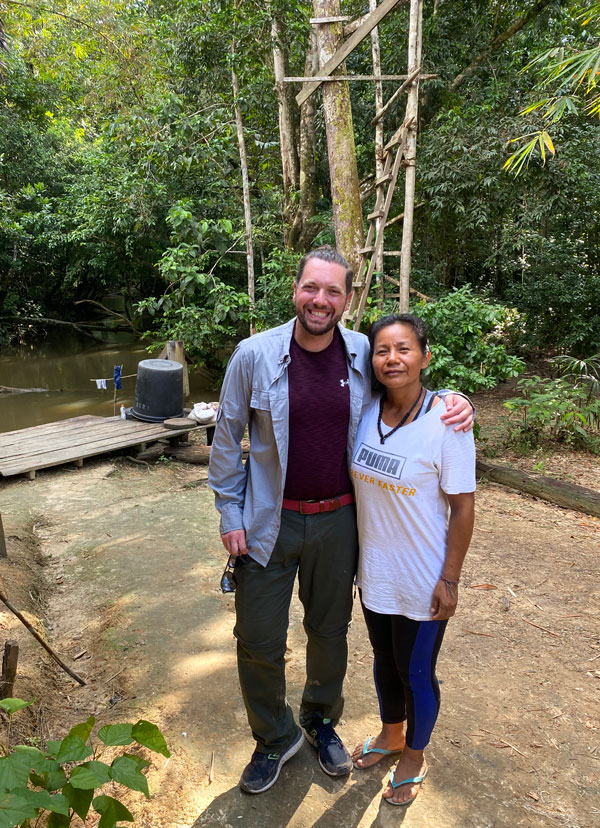
Analita introduced us to her elders, including Abuelo (her grandfather), and the matriarch, or very clearly, the woman in charge, Abuela (her grandmother). The extended family lives together in their ‘La Chibavaña,’ and they are part of the Murui Indigenous community, who are among the 65,000 people who live across the 400,000+ square kilometers that take up about a third of the Colombian country (Culture Trip, 2023).
The family lives far from the influences of the world outside the Amazon, and they tend to their chagras, a family-maintained orchard that provides all the fresh sustenance the family needs. This garden helps sustain their family with a bounty of rich produce. The family prepared a meal of river fish, a large one they had caught in the waters outside their chagras. Also, the dessert was delicious, if I do say so myself! In fact, I made it.
Cooking with Abuela
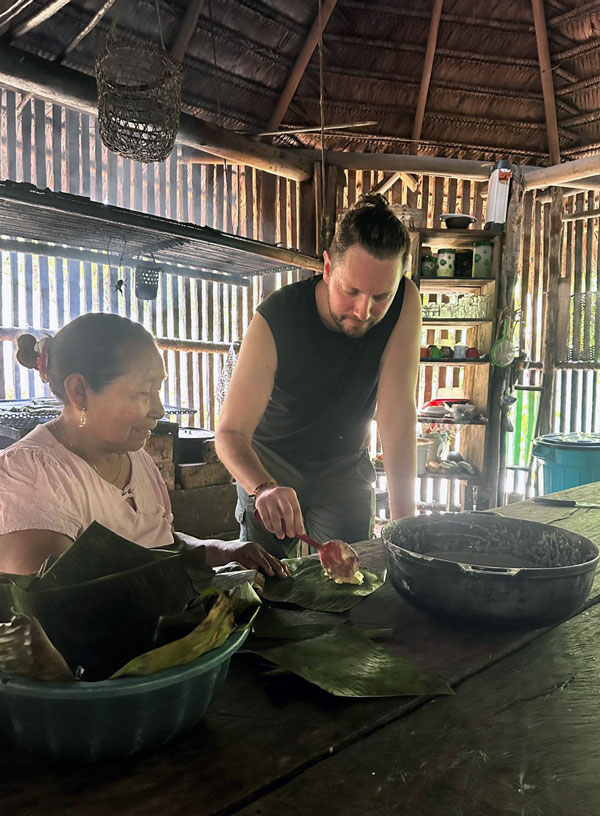
That afternoon, the entire group went on a tour of the family’s orchards, and though tired, I also anticipated an opportunity to help the women who were preparing lunch for our group, and I believed that it would be an opportunity to build an authentic connection with the family, who was so graciously hosting us for the day. Plus, it meant I could stay under the canopy of the shaded open living space. I asked if I could be helpful and Abuela smiled and pointed, sending me outside the kitchen to wash my hands in the nearby basin.
I saw our entire group disappear, as they made the trek up the hill to visit the family’s farmlands. I came back to the table and was instructed to sit down. I was handed yucca and asked to mash it with my hands, and then I cut in ripe bananas with chopped Brazil nuts. This was mixed in a large bowl, again, with my hands. I felt like a kid again making the batter, but then the real fun began.
A stack of trimmed banana leaves were brought to me. Abuela demonstrated how to lay the dough and then properly wrap it in the banana leaf; the little package was pat flat and then transferred to the open fire, where it was grilled. I flipped it with my hands and an Auntie, or as I called her, Tia, brought over a towel for me to mop the sweat dripping from my face, while Abuela was shouting, “Hurry,” with a deep belly laugh — she wanted to beat the sweat before it ran from my face and into the mix! After wiping my face and forehead, I placed the towel on a nearby nail; I thought I might need it later.
Grandmothers
When I was introduced to Abuela, I was also met with familiar feelings from childhood. I was, in part, raised by my grandmother, and though I had not felt that feeling for a long time, there was a welcoming spirit from Abuela and her family. Together, we had about 30 or 45 minutes where we discussed relationships, family, education, work, and our values. We talked about love too, and her universal acceptance of it.
When we finished the last package of banana leaves, Abuela told me to wash the bowl. I started walking to the basin and she yelled, “Al Rio” [to the River]!” There was a whole system in her kitchen that I had to learn — just like my grandmother’s. I walked out of the open kitchen and entertaining area and went to the edge of the water where I saw a small brush to wash dishes. The current took the batter, and I imagined it would make for some delicious fish food.
I came back up the hill to sit with the women at the long dining table again. Conversation, all in Spanish of course, started again. We talked about our deep love for the world and connection to nature. We covered a lot of ground in a short time. Upon reflection, this experience was the highlight of the trip, so far, for me. It was a great privilege to be welcomed into such a beautiful home to learn more about the Amazon region and the incredible people who live there.
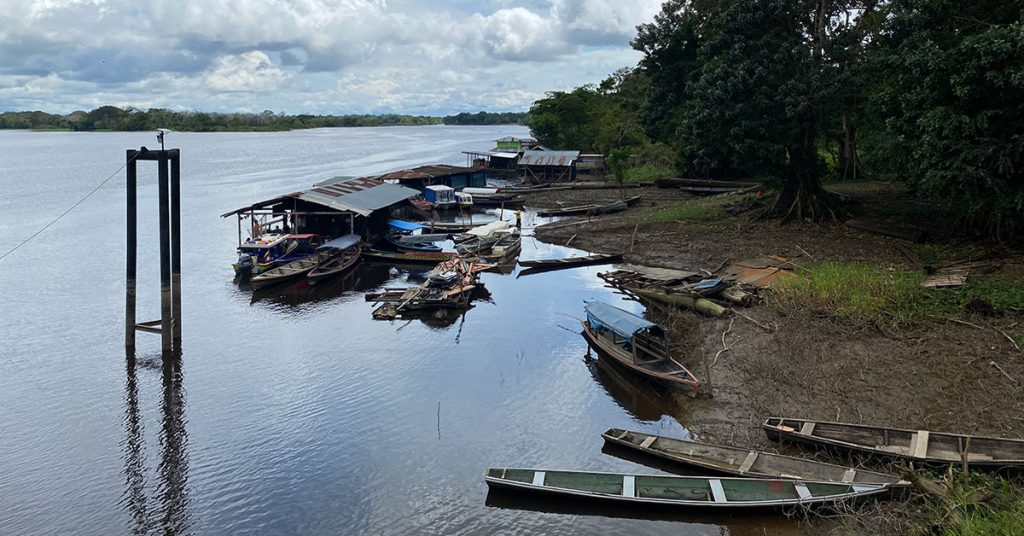
Into the river
After lunch, I remembered I had placed the towel aside, and I asked if it was safe to swim in the river that passed alongside their home — we hear stories about snakes and piranhas and plenty other things to worry about.
What was true: This river brought water, protein, power, sanitation, and beauty to their home. It also could bring relief from the heat. Their son, Carlos, exclaimed, “Yes, you can swim!” With some trepidation, I trusted our hosts, got into my shorts, and jumped in. The other scholars were shocked, but on a hot day in the Amazon, it WAS refreshing relief. As I tread water, surprised by how quickly it deepened and how quick the current was, I enjoyed the cool river that moved with some force through the land.
I caught the gaze of my colleagues at the water’s edge, and one by one, they joined in. One said that I was like a Siren calling to them from the water. For a few minutes, I enjoyed respite from worry and enjoyed the refreshing waters. Until I felt something hit me, and though I thought it could be an anaconda, it was the leg of another Fulbrighter. Still, it was a reminder that I was in the river of the Amazon, and I paid attention to my surroundings, respecting the wild.
After grabbing the towel as Abuela called for me, Carlos told me that he saw an anaconda in the river the day before our visit. He assured me the snakes were not interested in being in the area with humans around. It was a great lesson for the respect of nature, and the group eventually made it out of the water without issue.
Ritual birthday celebration
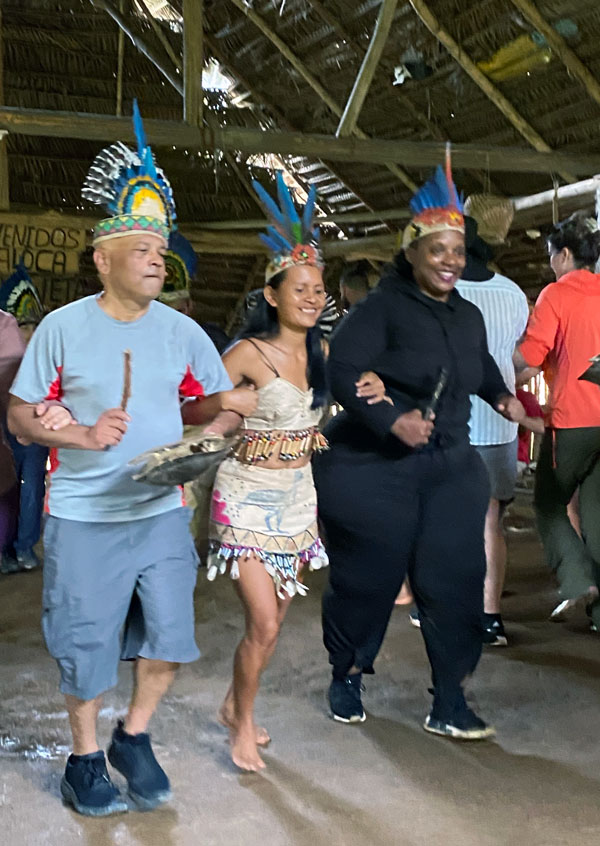
The group boarded a riverboat tour to see the ecosystems of the Amazon and its rivers. We visited the Tikuna indigenous community in another settlement along the banks of the river. We were introduced to their art, and one of their elders shared a ritual birthday celebration. This day also brought us close (in some ways too close) with nature, as we witnessed the Amazon pink dolphin feeding in the areas where bodies of water came together, rich with fish.
During another stop, little monkeys jumped from the trees and onto passersby in the hope of finding food. One jumped right on my head and started nestling on my neck! We ended the day visiting another family’s home along the banks of the river, and we saw the beautiful lotus flowers at the Natira Victoria Regia Reserve. It was a day rich with cultural exchange and full of biodiversity appreciation.
MEETING WITH SCHOLARS
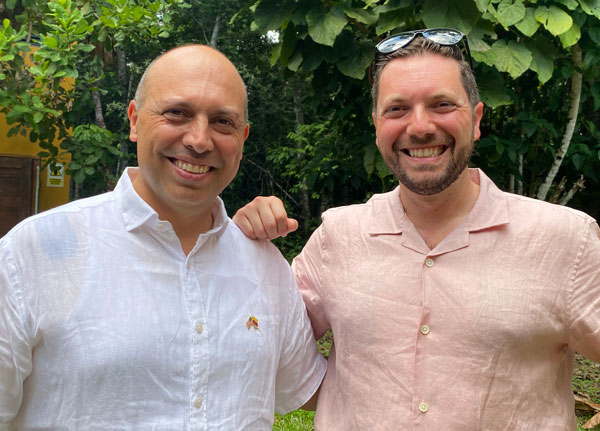
Renewable energy
Another day, at the Amazonas’ campus of Universidad Nacional de Colombia, we met with and learned from scholars in the region. Camilo Younes Velosa, former Vice Rector of Research and current professor, presented a talk on what he called, “just energy transition.” His lecture helped us understand the social, economic, and environmental aspects of the transition from fossil fuels to renewable energy sources. He asserted a new framework for energy justice that included active participation of communities as well as improvement of their quality life and wellbeing.
Freshwater fish
Professor Ana Milena Manjarrés gave a seminar on fish distribution and fishing. Her work explored the ecological patterns and sustainable fishing practices in Colombia, and she described key factors influencing fish distribution while also describing strategies for responsible fishing practices. I was intently drawn to the slides that Professor Milena Manjarrés showed, because there were many scientific illustrations of fish.
At one point, I became confused. I recalled eating at one of the favored restaurants of the area the night before, and at the time, I was pleased with what I thought was the opportunity to enjoy fresh fish from the sea (like I was back in Rhode Island). The menu offered Corvina, with traditional sides of yucca and salad. We had eaten so much freshwater fish from the Amazon over the past number of days, I was eager for this change.
But then, she said, “And yes there’s the freshwater fish Corvina, here.” I raised my hand and asked, “But wait, I thought that was a fish from the sea, because I eat that at home?” She laughed and said that this was an important question. She explained that at one time, the ocean – or salt waters – were in this area, so there were sea fish that eventually became freshwater fish. This moment brought two reminders — most importantly how much change these ecosystems continued to endure, and for me, I realized I enjoyed freshwater fish after all.
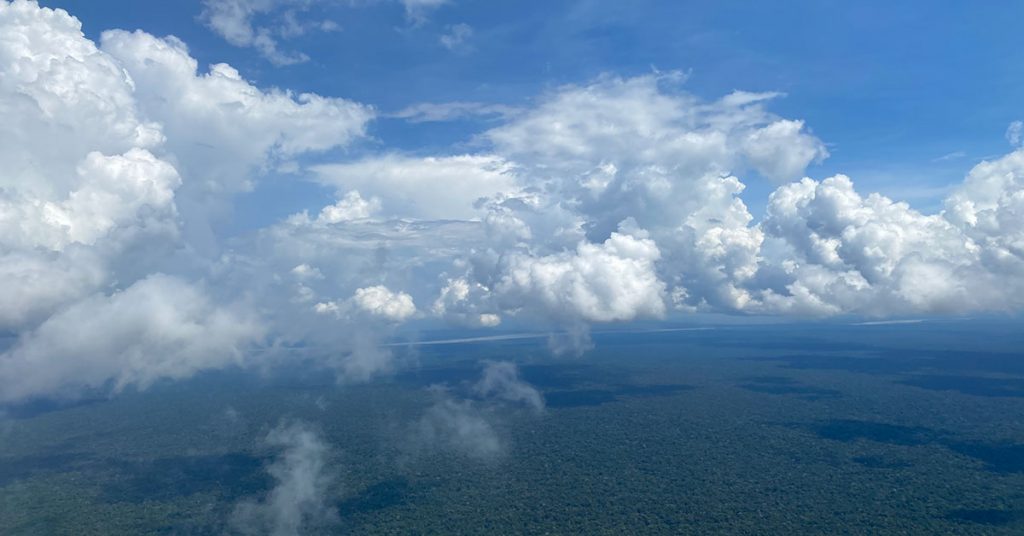
New Ways Of Thinking
Toward the end of our conference, a journal published by the University was handed out. That evening, I read the concluding paragraph in an article discussing the idea of tube, or a symbol and vessel of life in both form and movement (Hugh-Jones, 2017 as seen in Mundo Amazonico). The author claimed that, “The idea of tube is form not content — you can use it to interpret all kinds of things in all kinds of ways.” I thought back to the fish in the Amazon and on my plate, and I also reflected on these travels to date. An experience like this helps one see things from different vantage points and might even bring awareness to new ways of thinking or understanding. This, I think, is the point of a Fulbright experience.
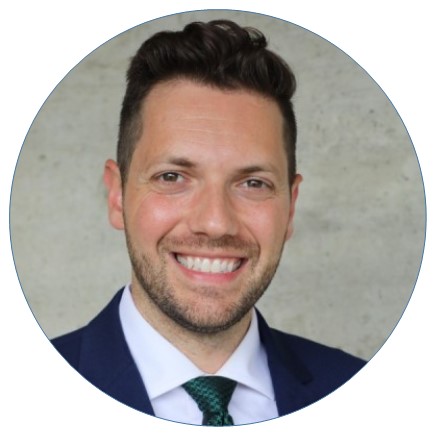
About Dr. Bobby Gondola, Jr.
Dr. Bobby Gondola Jr., Adjunct Professor in Johnson & Wales University’s (JWU) Master of Business Administration – Nonprofit Management degree program, is completing his second Fulbright Commission-sponsored research trip to Latin America during June-July 2024. As the only participant from New England, he joins 12 scholars from other higher education institutions throughout the United States for a month-long trip to Colombia.
Accompanied by faculty members at various universities in Colombia, Dr. Bobby and his colleagues will delve into the country’s incredibly rich biodiversity and environmental climate. The theme of the trip centers on environmental sustainability and energy, in large part due to over 70% of the electricity of Colombia being generated by hydroelectric means. To learn more about Dr. Bobby Gondola’s Fulbright Commission-sponsored research travels in Colombia, read his Blog #1 – Bogota.
